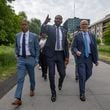The rats keep coming out of the woodwork.
This time it’s Leslie Moonves, chairman and CEO of CBS, who has resigned in shame — if shame can be said to exist anymore — after multiple women came forward to credibly accuse him of sexual harassment and assault and of professional retaliation against those who dared to rebuff him.
The allegation that Moonves has acted as a sexual predator for decades, unchecked and unchallenged, is only the latest of such charges against powerful men in a variety of fields, from film and comedy to news, politics and religion. Those industries have high media profiles and are extremely sensitive to public attention, but the problem is no doubt equally prevalent in workplaces from fast-food restaurants to assembly lines to sales.
All that said, I admit to being shocked by it. It has never been a secret that some men, given the opportunity, would use positions of power to extort and bully women. That has been true since the beginning of time, but we had supposedly developed legal, social and cultural barriers to guard against it. I am only now beginning to understand how thoroughly, and on what a large scale, those safeguards had failed.
And yes, right about now, at least half of you reading these words — the female half — are thinking some version of “no kidding, dummy.” Women know, if not from their own experiences then from those of their sisters, daughters, mothers, friends and co-workers. They know because those victims who don’t dare go public with their experience, those who know that if they speak up their livelihood would disappear, their careers would die and their reputations would be ruined while the perpetrator would probably skate free — those victims often do tell their stories more privately, to those who would listen and believe them. Women know almost instinctively that an entire legal, bureaucratic and cultural superstructure — run largely by and for men — exists to protect the predators and suppress any who dare to challenge them.
We have walked a similar revelatory trail regarding allegations of police violence against black Americans. The stories were always out there, but individual cases often came down to claims and counter-claims, so those of us outside black America had trouble sifting truth from mythology. Within black America, they knew better — not in every specific case, maybe, but in general — and black America tried to tell the rest of us.
However, a system of silence and repression similar in purpose to that protecting sexual predation in the workplace has served to protect the perpetrators of police violence as well. The rules, written and unwritten, have been stacked against the truth, and against the victims. (Take a look at the tragic and infuriating Sasser case out of Brunswick, Georgia. for a glimpse into how law-enforcement protects its own.)
It has taken technology, in the form of cells phones and body and surveillance cameras, to force people like me, white Americans, to come to grips with the scope of the problem, and even now some downplay or deny it. When black athletes attempt to draw attention to the problem, it is still easier for some to accuse them of hating their country or disrespecting the military than to address the true content of their speech.
But as hard as it is to remember at times, remember nonetheless: This turmoil, this shattering of false assumptions and the heartache it brings, is healthier than our previous placidity. This is the tough work from which progress is made.
About the Author





